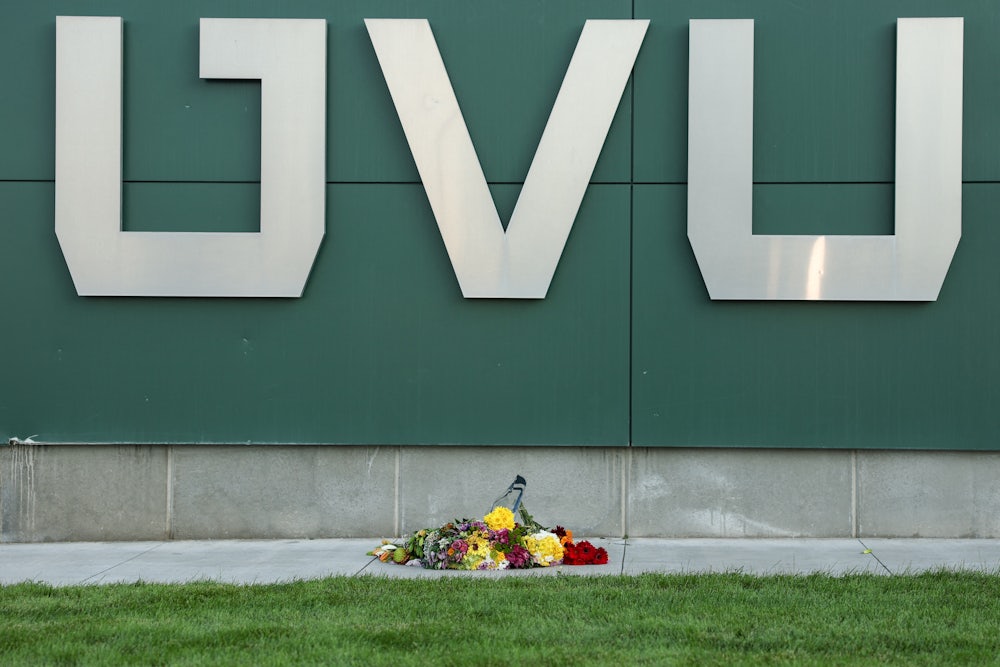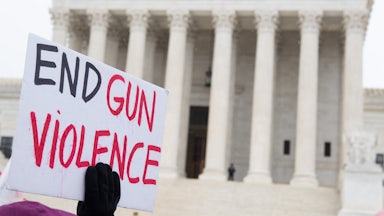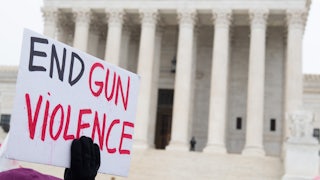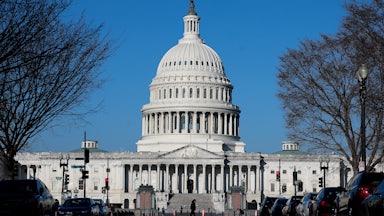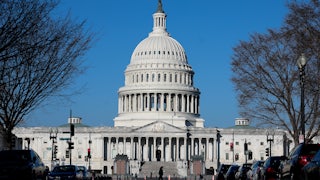Ezra Klein writes in The New York Times that Charlie Kirk, who was assassinated Wednesday at Utah Valley University, or UVU, was “practicing politics in exactly the right way. He was showing up to campuses and talking with anyone who would talk to him.” I agree that Kirk, at least in his live campus appearances (not so much in his tweets) was appropriately civil to those who disagreed with him.
But I disagree with Klein’s condemnation of people “on the left” who take this moment to consider that Kirk “defended the Second Amendment, even admitting it meant accepting innocent deaths.” An unavoidable and necessary question in the wake of Kirk’s horrific killing—one that I pose in the same spirit of respectful debate with which Kirk himself engaged the topic in this campus appearance last month—is whether the kind of gun control laws that Kirk firmly opposed could have saved his life.
At the moment, we lack sufficient facts to claim any definitive answer. I’ll concede up front that the equally horrific assassination this summer of Melissa Hortman, former Minnesota House speaker, and her husband, Mark, and the shooting of state Senator John Hoffman and his wife, Yvette, occurred in a state with relatively strict gun laws. That doesn’t erase the fact that Kirk died in a state, Utah, whose laws make it ludicrously easy to bring a firearm onto a college campus.
I make the following argument not to argue that Kirk “got what he deserved.” That’s a barbaric idea, and anyone who voices it merits censure. Nobody “deserves” to be attacked violently. Even in self-defense—which this most emphatically was not—violent actions may be justified, but they’re never deserved. The killing of a 31-year-old man is a senseless tragedy, period.
But Kirk’s death constitutes new information in the gun control debate, and Kirk would be the first to agree that new information requires reconsideration (or at least recalibration) of political arguments. Were Kirk and his organization, Turning Point USA, right to oppose all forms of gun control? The facts here suggest not. Were armed bodyguards and police protection (six uniformed police plus plainclothes officers) sufficient to safeguard Kirk from the shooter? No. Did “accepting innocent deaths” include Kirk accepting his own untimely death? I very much doubt it, though we may hear some gun rights advocates claim so in the coming days.
Kirk was killed by someone (what little we know about the shooter points to a college-age male) who fired from a campus rooftop with an older Mauser 30.06 high-powered bolt-action rifle. Unlike the AR-15 that Thomas Matthew Crooks used last year when he tried to assassinate candidate Donald Trump, the gun that killed Kirk was a hunter’s weapon. Gun control advocates rightly want to ban AR-15s, but they aren’t interested in taking bolt-action rifles off the market.
Still, ask yourself what somebody was doing carrying a large hunter’s rifle around a university campus. The answer that Clark Aposhian, who chairs the Utah Shooting Sports Council, gave The Salt Lake Tribune is that Utah may be the single most permissive state in the country with respect to gun laws. “It’s never been against the law here to lawfully possess a firearm on a college campus,” he said. Eleven states permit guns on college campuses; only Utah explicitly bars campuses from banning them.
Was the shooter concealing his rifle or carrying it out in the open? It hardly matters; since 2021 state law has permitted both, usually without a permit (though a permit is required if you carry on a college campus). Permits are available starting at age 18. If you’re between 18 and 21, you aren’t allowed to carry a loaded gun in public without a permit, but if you’re a college student you need a permit anyway to carry your gun around campus. Earlier this year, the U.S. Concealed Carry Association rated Utah one of the 19 most gun-friendly states in the country. Based specifically on Utah’s laxity about campus carry, the Brady Campaign to Prevent Gun Violence in 2011 gave the Beehive State a score of zero for not having “a single common sense gun law.”
This “right” to carry a concealed or unconcealed gun on a college campus was reaffirmed in state legislation passed earlier this year. If you keep your gun in your dorm room, you don’t even need a permit. Think of it as an emotional support animal that doesn’t pee on the floor. “As an institution,” says the website for the UVU Police Department, “UVU respects the right of its students and others to legally carry a concealed firearm under those parameters, as outlined by state law.”
The state’s laissez-faire position on campus carry explains how Kirk’s killer could have been carrying a rifle (or something long enough to contain one) at UVU for approximately half an hour without attracting notice (except from video cameras that enabled investigators to retrace the shooter’s movements after the fact). Meanwhile, security screening at the speaking event was either light or nonexistent; Deseret News reporter Emma Pitts said that when she entered the venue she wasn’t scanned and her bag wasn’t checked.
In Utah, universities may not take it on themselves to ban guns from campus. I don’t know how UVU faculty feel about that, but according to the Tribune, faculty at the University of Utah really don’t like it. “It feels like this is an incredibly dangerous situation for our students, faculty and staff in our spaces, as well as guests,” Sydney Cheek-O’Donnell, an associate dean for research, told the Tribune. No kidding! In Utah, the only public spaces permitted to ban guns are churches (no guns in Mormon temples), courthouses, prisons, police stations, airports, mental health facilities, homeless shelters, and federal sites.
We don’t yet know the identity of the killer or his motivation. But it’s a good bet that he’s mentally ill; prepare yourself for hateful and distressing social media posts, perhaps even announcing in advance murderous intentions. But mental illness doesn’t pose much of an obstacle if you want to get a gun in Utah. Federal law says you can’t get a gun if you’ve “been adjudicated as a mental defective or [have] been committed to any mental institution,” which is pretty loosey-goosey. Utah adds that you’re in the clear if “the adjudication has been withdrawn or reversed.” It further adds a lengthy list of exacting conditions to rule a person “mentally defective” for the purposes of gun ownership.
This isn’t rocket science. States that have less restrictive gun laws experience greater gun violence. A 2022 study by the Center for American Progress found that the states with the highest homicide rates were all assigned an “F” grade by the Brady Center. In Utah, gun deaths have long exceeded the national average, and they’re rising fast, increasing 19 percent between 2014 and 2023.
Did Utah’s weak gun laws kill Charlie Kirk? We can’t say that. But weak gun laws probably made his death more likely. Kirk’s admirers will do his legacy no favors if they continue to oppose gun control. Better that they join the rest of us in working to prevent the next Charlie Kirk from meeting the same awful fate.
